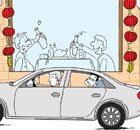Opinion
Barriers can never be good for anybody
By Tom G. Palmer (China Daily)
Updated: 2009-12-29 07:52
 |
Large Medium Small |

Trade protectionism should be restricted, because it brings no benefit to any nation. The United States and the European Union have imposed a series of protectionist measures against China over the past few months.
The fact that politicians talk about free trade but adopt measures to the contrary indicates protectionism is coming in from the back door. Protectionism may benefit a small, special group of people, but that comes at the cost of greater public interest. Take the special tariff imposed by the US on China-made tires as an example. The increase in the prices of Chinese tires has not saved a single job in the US. It has only harmed American consumers.
Politicians should think about trade more rationally, not from the narrow perspective of nationalism. Many politicians have failed to imbibe the positive economic wisdom because of their misunderstanding of free trade. It is a universal problem and it affects all of humanity.
The significance and benefits of free trade is evident in some simple truths of economy. The simple act of voluntary exchange creates wealth, and adds value to the world. With exchange, we may value our holdings more than before because buyers may value them more. It is easy to understand that individuals will not exchange anything if it does not add value for them.
We can see exchange at a higher level. The division of labor for the purpose of exchange may create tremendous wealth. It is related to another principle called comparative advantages in production, which most politicians do not grasp.
Economics Nobel laureate Paul Samuelson was once asked if there is a basic principle in economy that is true but not obvious. His answer: the principle of comparative advantage. In discussions of exchange we should focus on comparative advantage, which is often confused with absolute advantage. Comparative advantage is the foundation of human cooperation. By exploiting comparative advantage, people are capable of consuming more than they can produce.
Different individuals, enterprises and countries have different comparative advantages. The key is to focus on things that they are most efficient in. Specialization cultivates more efficient producers and can lead to maximum production of each good. Then all of them gain more by exchange.
Some politicians don't understand that free exchange is not a zero sum game. People are accustomed to considering wealth as a fixed pie. They think that "if someone else gets a bigger slice, mine will be smaller". Actually, it is a good thing if your trade partners become wealthy, for they will have more to exchange, that is, they will make the pie bigger.
Do foreign traders like to do business with China in 2009, or did they prefer doing so in the 1950s? The answer is obvious, because Chinese are more efficient and wealthy today. They can now make more products and have created a bigger market for trade.
To some extent, civil society is based on trade and exchange, too. "Civil" comes from the Latin word "civitas", which means city, a place chosen by merchants for trade. People create wealth through civil and peaceful cooperation. And free trade creates international civil society.
In the economic world, competitors are individuals and enterprises rather than nations. Enterprises have to compete both with domestic and foreign companies. Thus, products tend to have no nationality because production becomes a multi-national process.
Toyota, Volkswagen, BMW and other carmakers have factories in the US and they add value to that country. It does not matter whether they are American companies or not.
Finally, seldom do people realize that free trade promotes peace, too. Some American economists' studies show that trading nations cooperate more and fight less. Statistics prove that doubling of trade leads to a 20 percent diminution in belligerence. The reason is quite simple: People seldom kill their customers. It is hard for buyers and sellers to severely harm each other.
Promotion of peace is a valuable byproduct that free trade brings to the world. Therefore, people who oppose war should also oppose protectionism.
The root of trade protectionism is that protectionists don't realize the benefits available in free trade. Since the negative influence of protectionism is becoming evident, leaders of Western countries should stop resorting to it - for the sake of their citizens as well as that of the rest of the world.
The author is a senior fellow of Cato Institute and vice-president for international programs at the Atlas Economic Research Foundation. This article is based on a speech he delivered at Peking University recently.













